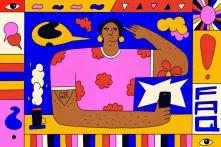‘Identity’ comes from the Latin word ‘idem’, meaning ‘the same’. We have now known since the beginning of the 20th century at the latest and the debate around the human psyche, that the human soul is never the same, but contradictory and shifting. To name just one field of tension that structures inner human life: the unconscious is not identical to the conscious.

Identity as a feeling and the knowledge of oneself is not given to people at birth, rather it develops over the years. Identity thus delineates the dialogue between individuals and society. Identity as a feeling and the knowledge of and for oneself bears a relation to social and individual learning, experiences, collective attitudes and regulations, and at the same time, is always very personal. In short, the problem with identity politics begins with the term ‘identity’. This seems to be due to a desire to know, once and for all, who I am. Yet identity is not a state, but a process. It is based on many factors and significantly develops in the field of tension between stagnation and change.
What does that mean?
If individual identity is already related to societal fields of tension, narratives and attributions, then this is all the more true for the phenomenon of identity politics. Then policymaking with definitions of others and oneself is always part of societal debates on belonging and difference. That is to say, identity politics is part of society and society in part of identity politics. Identity politics is thereby an umbrella term. Its meaning is not only vaguely defined, but all kinds of, and even completely contradictory political concepts can be found in this ‘word receptacle’. In this way, identity politics can serve to preserve or overcome hierarchies. This depends on the respective political standpoints and perspectives.
Hegemonic identity politics divides society into groups and allocates these groups entrenched precedence. Therefore, men are stronger and more rational, and consequently better citizens than women. According to this perspective, people identified as white are considered more sophisticated than Black people, for instance, and natives better than newcomers. The list of hierarchical codifications does not stop there.
Even French Revolution was an expression of identity politics. The uprising against the dominant aristocracy was underpinned by the idea that only men were accorded the democratic rights and freedoms demanded for by the bourgeois class: liberté, egalité, fraternité. Olympe de Gouges simultaneously countered this patriarchal logic with a progressive, feminist identity politics. She too fought for the French Revolution, but wanted for women to no longer be considered second-class citizens and ended up on the gallows for it. The class struggles that established workers as equal citizens before the law are also part of the identity politics that democracy has produced and further developed. The same goes for the struggle for women’s suffrage. This list could also go on much longer.
With historical hindsight, it must be said, whether it comes from a patriarchal or feminist side, bourgeois culture, as well as positive class affiliation, have predominantly been linked to being white. Thus, the French Revolution for instance, was not essentially directed against the transatlantic slave trade and against colonialism which occupied and exploited almost 70% of the world. Only the struggles for liberation in the former colonies brought the demand for civil rights for all people everywhere into Western bourgeois consciousness. Only they brought these struggles into the political landscape internationally, represented by the UN, for instance. Progressive identity politics, like any other political movement, nevertheless also suffers from conscious or unconscious exclusion. It is therefore, never above criticism per se. This is exactly why the questions are so important: Who is sat at the decision-making table? Who is represented and heard – and who is missing? To this day, groups devalued as minorities are struggling for the full recognition and implementation of their equal rights. In Germany and worldwide.
What is next?
That for an honest, democratic discussion it is indispensable, first of all, to differentiate between hegemonic and progressive identity politics, and second of all, political demands have to be located within this field of tension.
In other words, it is a matter of analysing individual positionality and considering that this substantially shapes respective views of the world. What is therefore needed is an awareness that identity politics does not just begin with the resistance against entrenched hierarchies and the attributions associated with them. On the contrary, whether colonialism, National Socialism or fascism, in each case it was a matter of radical forms of identity politics that categorised people by various racist attributions, as well as the category of ‘being white’ into worthy and unworthy of life, and that continue to do so in various places to this day. All in all, any form of favouritism of people who are perceived as ‘normal’ is an expression of an identity politics that is not necessarily reactionary, but conservative. Because norms reflect relationships of power. Or rather, they tell the story of the victors.
In contrast to reactionary identity politics, it is typical of conservative identity politics to not perceive itself as such in the least. Yet the majority of people cannot be placed in dominant categories of whiteness, patriarchal masculinity, heterosexuality and non-disability. At the same time, the dominant culture is based on the supremacy of exactly these allied categories: The white, non-disabled person, who is perceived as male and acts in line with patriarchy, is deemed the norm. And that is a problem progressive identity politics is approaching.
This leads to a third thing: The phenomenon of identity politics is much older than the term. This was first coined by the Black feminist Combahee River Collective in 1977 and is a key point of reference for progressive identity politics to this day.
Exit Strategies
A democratic, human rights oriented ‘We’ has to be interested in bringing transparency into the thicket of identity politics. It must be concerned with breaking through the strategy of othering, so no one else is declared as Other. Experiences of discrimination must be taken seriously and systematically fed into the political discourse. For this purpose, it is fundamental to understand identities as inherently socially influenced attitudes that nevertheless feel, and are, quite personal and private. And it is necessary to consistently ask oneself anew: Who is sat at the decision-making table – and who is missing?


